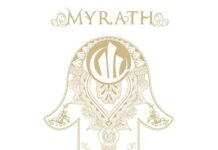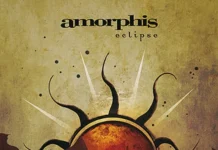A whopping 20+ years ago, a young Bear Wiseman was in the process of getting into heavy metal and discovered a band called BLIND GUARDIAN that she immediately fell in love with, thanks to the clear fantasy influence on their sound. After falling heavily in love with “Nightfall in Middle Earth,” the band made fans wait 4 years before their next release, with its title dedicated to the QUEEN album of the same name: “A Night at the Opera” (which is in itself a tribute to a Marx brothers film). This album was not only a great new release by this legendary epic fantasy metal band, as each song references a different story or legend, ranging from the bible to politics and philosophy to Greek literature. On March 25th, 2002, this album saw the light of day, so we’re looking back on it today, on its 20th anniversary!

While the different style of artwork has never been among my favorites from BLIND GUARDIAN, the collection of songs certainly hit its mark, so don’t judge this album by its cover. “A Night at the Opera” marks the biggest shift away from their earlier power metal style, into a slightly more progressive feel, though not my completely losing their roots. “Precious Jerusalem” starts the album off one an incredible note with siren-like guitar shrieks and fantastic drumming that has a lot of spice added from those guitars. Hansi Kürsh on vocals begins exploring the various sounds he can make, starting high and getting more melodic at times, with plenty of vocal layering to add texture throughout, but especially in the chorus.
The album takes a turn into German folklore with “Battlefield.” The song starts on a deceptively mid-tempo note before kicking up dramatically. Based on the Song of Hildebrand, this song takes the dramatic start to the album built by “Precious Jerusalem” and carries it onward. The soloing is very nicely done and the use of drama in the drums, combined with choirs backing Hansi makes for a really bombastic song. “Under the Ice” continues to show off a more melodic side of the band, though the classic power metal influences shine through in the riffing and powerful pushes. This is the first song on the album to reference The Iliad, while the following “Sadly Sings Destiny” follows the first track’s lead with another bible story. There’s a pretty rockin’ guitar riff opening up a biblical song, but no one’s complaining. The growing chorus of whispers that build up to the starting words always gets me hyped.
Interestingly, at this time in my life, I was very interested in the “original” Romeo and Juliet story, Tristan and Iseult, which I learned had inspired the song “The Maiden and the Minstrel Knight,” and quickly became obsessed with it, you know, because I wasn’t very objective back in the day. The song paints a rather renaissance-y picture with the use of orchestrations, surely worthy of its setting. While nowadays I don’t find it quite the magical romance ballad I thought it was 20 years ago, as the chorus is pretty simple, the song still does have a bit of magic to it thanks to that courtly sound. With a surprising turn, there was a bit of a political spin on “Wait for an Answer,” which is also one of the slightly more straightforward songs musically, as the orchestrations are far more understated here.
The album steps back into geek territory with “The Soulforged,” which is based off the saga of the same name from the Dragonlance fantasy book series, which was voted for by fans. Strong guitar lines lead this one, which seem to never relent from start to finish. There’s another kick of drama with the piano intro to “Age of False Innocence,” which slowly builds up to Hansi singing, “I’m not afraid anymore,” before the energy picks up and the drums push forward. It’s a shame that Thomen Stauch (drums) didn’t like the direction this album took and subsequently left the band, as his performance is really quite spectacular. The Nietzsche-themed “Punishment Divine” has another gorgeous combination of guitars and drumming backing Hansi, but it takes listeners on a rather wild ride, taking its sweet time before approaching anything resembling a chorus. Don’t think it doesn’t have any of that relentless power metal push and shred though, as there is plenty to be found here.
And then we reach the end with “And Then There Was Silence,” BLIND GUARDIAN‘s (and my personal) first-ever long epic, clocking in at over 14 minutes in length. This was the band’s first effort into creating a long, progressive, storied piece that was inspired by the works of Homer (The Illiad and Odyssey) and Virgil (Aeneid). Where to even start with this song? The riff-based intro with glorious synth and orchestral backing? The vocal layers? The storied progression? The masterful twists and turns? If the band wanted to dip their toes in the prog pool in the rest of the album, they jumped in head-first with this piece and managed to find their stride beautifully. I still remember using this song to help the time pass more quickly in long car rides, and it still holds up now. Perhaps my favorite part is just beyond the halfway mark… it’s just really magical, and yet it never gets boring as it progresses on to its glorious climax and instrumental outro.
Ultimately, stepping out of their usual playground did wonders for BLIND GUARDIAN. While power metal fans may have disliked this new degree of epic/symphonic expansion to their style, it nevertheless shows the first steps that the band took to developing the sound that they are quite beloved for nowadays. On a personal note, I found this album hard to write about, as the band clearly worked on adding progressive theatricality into the music in every song, making it both very cohesive and hard to pick apart, despite there being so much generally going on in each song. There was clearly a lot of development into the orchestral sound, yet there is still classic BG riffing and the wonderful vocals we all know and love to keep it familiar. Instinctually, my thought on this album would simply be that this was a hit or miss for fans on a deeply personal level – if you didn’t mind the epicness, surely this was a bit hit, but if you were already on the fence about the band’s sound on the past couple of records, this may have been the one to break you away. Me… even if I can’t pick any hardcore favorite tracks off this album, I’ll never turn down a chance to spin this record and still won’t feel the need to skip a single song.
Tracklist
- Precious Jerusalem
- Battlefield
- Under the Ice
- Sadly Sings Destiny
- The Maiden and the Minstrel Knight
- Wait for an Answer
- The Soulforged
- Age of False Innocence
- Punishment Divine
- And Then There Was Silence
Lineup
- Hansi Kürsch – lead and backing vocals
- André Olbrich – lead, rhythm and acoustic guitars
- Marcus Siepen – rhythm guitar
- Thomen Stauch – drums & percussion
Label
Virgin / Century Media





